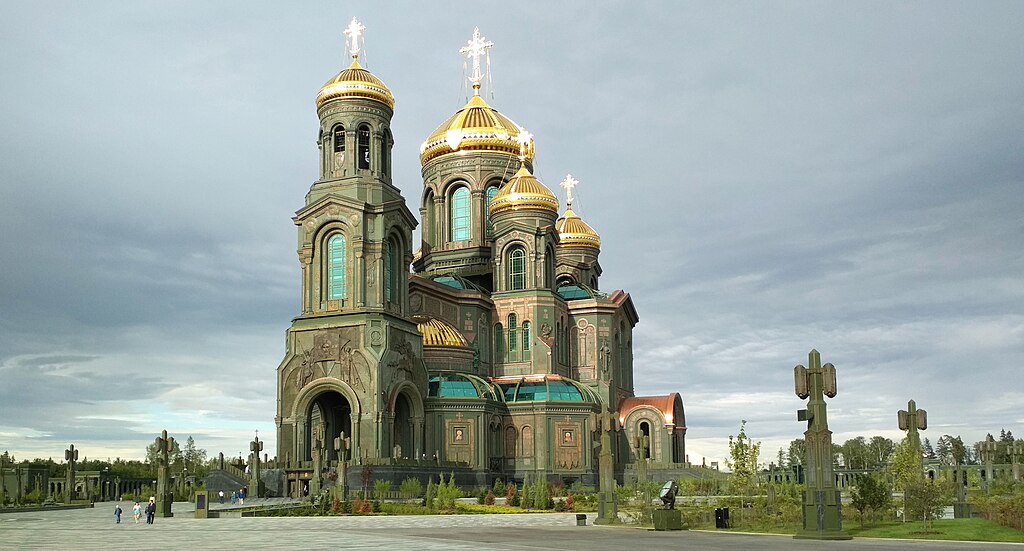The Kubinka Main Cathedral of the Russian Armed Forces, source (Wikimedia Commons)
This article was written by one of our guest authors and published in English. Would you also like to contribute to the FMS with your analysis on international politics and democratisation? Mail your submission to info@foundationmaxvanderstoel.nl
In recent years, the interplay between religion and nationalism has become increasingly pronounced in Russia, particularly under the leadership of Vladimir Putin. The concept of the "Great Russian World" (Russkyi Mir) has emerged as a central narrative, intertwining national identity with religious belief. This fusion of faith and nationalism not only serves to solidify Putin's power but also plays a critical role in justifying Russia's aggressive actions, particularly the invasion of Ukraine.
At the heart of this narrative is the idea of Holy Rus, which positions Russia as a protector of Orthodox Christianity and a bastion of traditional values. The Russian Orthodox Church, under Patriarch Kirill, has become a key ally of the state, reinforcing the notion that the military's actions are divinely sanctioned. This relationship has deep historical roots, as religion has long been intertwined with Russian imperialism. Kirill's elevation to Patriarch in 2009 marked a significant turning point, as he actively sought to merge religious authority with state power, thereby legitimising Putin's regime.
The Kremlin's control over the narrative surrounding the Russian identity is a strategic move to maintain social cohesion and prevent dissent. By framing the conflict with Ukraine as a struggle for the soul of the Russian people, the government seeks to rally public support and suppress counter-narratives. This manipulation of identity is not merely a political tool; it is a means of fostering a collective consciousness that views Ukraine not as a separate nation but as an integral part of the Russian sphere.
However, this approach is fraught with risks. The increasing reliance on religious nationalism has alienated many within Russia and Ukraine, particularly those who do not subscribe to the dominant narrative. The portrayal of Ukraine as a historical extension of Russia undermines the country's sovereignty and disregards the diverse identities that exist within its borders. This has led to a backlash, with many Ukrainians embracing their distinct national identity in opposition to Russian claims.
Moreover, the use of religious symbolism to justify military actions raises ethical questions. The invocation of a "holy war" not only distorts the true nature of the conflict but also risks deepening divisions within society. As the Russian government continues to promote a narrative of victimisation and messianic duty, it becomes increasingly difficult to envision a peaceful resolution to the conflict.
In conclusion, the intertwining of religion and nationalism in Russia under Putin has profound implications for both domestic and international politics. While it serves to bolster the regime's legitimacy and control, it also perpetuates a cycle of conflict and division. On the one side it legitimises a religious justification of the invasion, it pretends there is a one national identity of 'the Russian' and religious sentiment is manipulated. On the other hand, the conflict and division are perpetuated through a kind of exclusive (Russian) nationalism wherein all non-Russian identities and beliefs are seen as threats. This has consequences within one's own society, in relation to surrounding countries and at a geopolitical level. A growing internal repression of dissent and political and religious minorities creating fear and division within society. Through such treats the aggressive foreign policy, like the invasion in Ukraine and threats to other neighbouring countries, are explained. Their attitude towards Western nations and former Soviet states also leads to geopolitical tensions and to isolation and conflict.
As the situation in Ukraine continues to evolve, it is crucial for the international community to recognize the role of religious narratives in shaping national identities and to advocate for a more inclusive understanding of sovereignty that respects the diverse histories and cultures of all nations involved. Only through dialogue and mutual respect can a path to peace be forged, one that transcends the divisive narratives of the past. The ability of Putin's Russia to earn respect on a geopolitical level is under considerable pressure because of the narrative they promote and the subsequent actions they take.
You wish to learn more about this topic? Read this essay on the subject.





